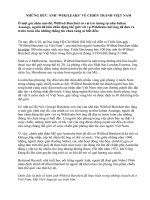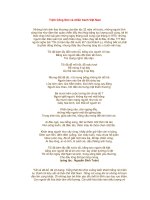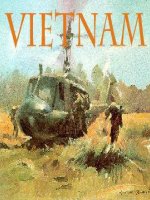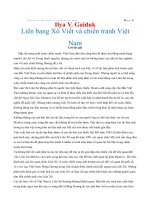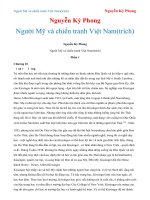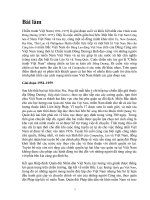Chiến tranh Việt Nam The vietnam war
Bạn đang xem bản rút gọn của tài liệu. Xem và tải ngay bản đầy đủ của tài liệu tại đây (4.08 MB, 57 trang )
Where is Vietnam?
Why Did the United States
Fight a War in Vietnam?
• Basically to hold the line against
the spread of world Communism.
America paid for the war the
French fought against Communist
Vietnam as a part of the Truman
Doctrine (1947) “to help free
peoples to maintain their free
institutions and their national
integrity against … totalitarian
regimes.” In the 1950’s, America
became involved again.
Longest and Most Unpopular War
• The Vietnam War was the longest
and most unpopular war in
American history. During the war:
– 58,000 Americans lost their lives.
• The oldest man killed was 62 years old;
the youngest, 16.
• 61% of the men killed were 21 or
younger.
– 304,000 were wounded.
– 75,000 were severely disabled.
– The United States spent over $200
billion dollars on the war.
Conflict Between France & Vietnam
• The Vietnam War grew out of
the long conflict between France
and Vietnam.
– In July 1954, after one hundred
years of colonial rule, a defeated
France was forced to leave Vietnam.
– Nationalist forces under the
direction of General Vo Nguyen
Giap defeated the allied French
troops at the remote mountain
outpost of Dien Bien Phu in the
northwest corner of Vietnam.
The Geneva Peace Accords
• The Geneva Peace Accords, signed
by France and Vietnam in the
summer of 1954, provided for the
temporary partition of Vietnam at
the 17th parallel, with national
elections in 1956 to reunify the
country.
• In the North, a communist regime,
supported by the Soviet Union and
the People's Republic of China, set
up its headquarters in Hanoi under
the leadership of Ho Chi Minh.
Opposition to Geneva Accords
• The United States prevented the elections that were
promised under the Geneva conference because it knew that
the Communists would win.
– Secretary of State John Foster Dulles thought the Geneva Accords
granted too much power to the Communist Party of Vietnam.
– He and President Dwight D.
Eisenhower supported the creation of a
counter-revolutionary alternative south
of the 17th parallel.
• This was accomplished through
formation of the Southeast Asia
Treaty Organization (SEATO).
A New Nation in the South
• Using SEATO for political cover, the
Eisenhower administration helped create a
new nation in southern Vietnam.
• In 1955, with the help of massive amounts
of American military, political, and economic
aid, the government of the Republic of
Vietnam (South Vietnam) was born.
• The following year, Ngo Dinh Diem, a
staunchly anti-Communist figure from the
South, won a dubious election that made him
president of South Vietnam
The Domino Theory
• American policymakers developed the “Domino Theory”
as a justification for the involvement. This theory stated,
“If South Vietnam falls to the Communist, Laos,
Cambodia, Thailand, Burma, India and Pakistan would
also fall like dominos. The Pacific Islands and even
Australia could be at risk”.
South Vietnam Under Diem
• Diem claimed that his newly created
government was under attack from
Communists in the north.
• In late 1957, with American military aid, Diem
began to counterattack.
– He used the help of the CIA (through Operation
Phoenix) to identify those who sought to bring his
government down and arrested thousands.
– He passed a repressive series of acts known as
Law 10/59 that made it legal to hold suspected
Communists in jail without bringing formal
charges.
Opposition to Diem
• The outcry against Diem's harsh and oppressive actions
was immediate.
– Buddhist monks and nuns were joined by students, business
people, intellectuals, and peasants in opposition to Diem’s
corrupt rule.
– The more these forces attacked Diem's troops and secret police,
the more Diem complained that the Communists were trying to
take South Vietnam by force. This was "a hostile act of
aggression by North Vietnam against peace-loving and
democratic South Vietnam."
The National Liberation Front
• The Communists
supported the creation of
a broad-based united front
to help mobilize
southerners in opposition
to the government in
South Vietnam.
• On December 20, 1960, the National Liberation Front
(NLF) was born.
– It brought together Communists and non-Communists in an
umbrella organization that had limited, but important goals
– Anyone could join as long as they opposed Ngo Dinh Diem and
wanted to unify Vietnam.
Washington White Papers
• In a series of government "White
Papers," Washington insiders
denounced the NLF, claiming that it
was merely a puppet of Hanoi. They
called it the "Viet Cong," a
derogatory and slang term meaning
Vietnamese Communist.
• The NLF, on the other hand, argued
that it was autonomous and
independent of the Communists in
Hanoi and that it was made up mostly
of non-Communists. Many anti-war
activists supported the NLF's claims.
December 1961 White Paper
• In 1961, President Kennedy
sent a team to Vietnam to report
on conditions in the South and
to assess future American aid
requirements.
• The report, known as the
"December 1961 White Paper,"
argued for:
– An increase in military, technical, and economic aid
– The introduction of large-scale American "advisers"
to help stabilize the Diem regime and crush the NLF.
The Kennedy Response
• As Kennedy weighed the merits of
these recommendations, some of
his other advisers urged the
president to withdraw from
Vietnam altogether.
• In typical Kennedy fashion, the
president chose a middle route.
– Instead of a large-scale military
buildup or a negotiated settlement, the
United States would increase the level
of its military involvement in South
Vietnam through more machinery and
advisers, but no military troops.
The Strategic Hamlet Program
• To counteract the NLF's success
in the countryside, Washington
and Saigon launched an
ambitious military effort in the
rural areas.
– Called the Strategic Hamlet
Program, the new
counterinsurgency plan rounded
up villagers and placed them in
"safe hamlets" controlled by the
government of South Vietnam.
– The idea was to isolate the NLF
from villagers, its base of support
NFL Successes
• This culturally-insensitive plan
further alienated the peasants from
the Saigon regime and produced
more recruits for the NLF.
• By the summer of 1963, because of
NLF successes and its own failures,
it was clear that the government of
South Vietnam was on the verge of
political collapse.
Buddhist Self-Immolations
• Diem's brother, Ngo Dinh Nhu, had
raided the Buddhist pagodas of South
Vietnam, claiming that they had harbored
the Communists that were creating the
political instability.
• The result was massive protests on the
streets of Saigon that led Buddhist monks
to self-immolation.
• The pictures of the monks engulfed in
flames made world headlines and caused
considerable consternation in Washington.
Military Coup
• By late September, the Buddhist
protest had created such dislocation in the south that the Kennedy
administration supported a coup.
• In 1963, some of Diem's own
generals approached the American
Embassy in Saigon with plans to overthrow Diem.
• With Washington's tacit approval, Diem and his brother were
captured and later killed.
• Three weeks later, President Kennedy was assassinated on the
streets of Dallas.
Escalation of the Conflict
• At the time of the Kennedy and Diem
assassinations, there were 16,000
military advisers in Vietnam.
– The Kennedy administration had
managed to run the war from Washington
without the large-scale introduction of
American combat troops.
– The continuing political problems in
Saigon, however, convinced the new
president, Lyndon Baines Johnson, that
more aggressive action was needed.
• After a dubious North Vietnamese raid on two U.S. ships in the Gulf of
Tonkin, the Johnson administration argued for expansive war powers
for the president.
Attack on American Ships
• In August 1964, in response to
American and South Vietnamese
espionage along its coast, North
Vietnam launched an attack against the
C. Turner Joy and the U.S.S. Maddox,
two American ships on call in the Gulf
of Tonkin.
– The first attack occurred on
August 2, 1964.
– A second attack was supposed to have
taken place on August 4, but authorities
have recently concluded that no second
attack ever took place.
The Gulf of Tonkin Resolution
• The Johnson
administration used the
August 4 attack to obtain a
Congressional resolution,
now known as the Gulf of
Tonkin Resolution, that
gave the president broad
war powers.
• The Resolution was
followed by limited reprisal
air attacks against North
Vietnam.
Operation Rolling Thunder
• In early 1965, the NLF attacked two U.S. army
installations in South Vietnam, and as a result,
Johnson ordered sustained bombing missions over
North Vietnam.
• The bombing missions, known as “Operation
Rolling Thunder,” caused the Communist Party to
reassess its own war strategy
Phosphorous & Napalm Bombs
• “Operation Rolling
Thunder” was backed up
by phosphorous and
napalm bombs – the
latter causing dreadful
burns to thousand of
innocent civilians.
Operation Ranch Hand
• When this failed to break down the jungle cover the USAF
started “Operation Ranch Hand” – the defoliation program,
using Agent Orange.
– This deadly chemical cocktail, containing dioxin, killed off millions
of acres of jungle to try to weaken the Vietcong – but left a
horrendous legacy in Vietnam.
– The dioxin got into the food chain causing chromosome damage
to humans. There were hundreds of cases of children born with
deformities.

